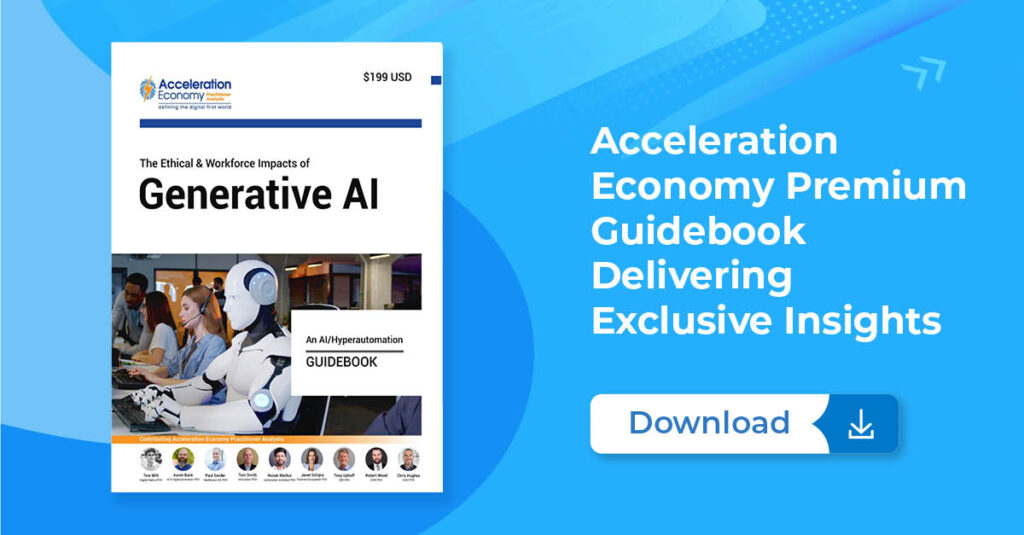
Digital transformation is leading executives to make larger investments in technology than they ever have before. Many CEOs are wondering how to set expectations for their tech investments in s artificial intelligence (AI). They are trying to be responsive to boards, shareholders, and employees who are asking how AI and other advanced technologies will impact their business.
Unfortunately, there is no simple answer on how to set expectations for AI’s impact on your business. At Acceleration Economy, we regularly share frameworks that business technology buyers can use to learn about, pilot, scale, and integrate AI into their business. But to a great extent, AI’s impact on your business will be based on your company’s experience.
However, there is a rapidly growing AI application that is delivering remarkable new business capabilities and may give you some perspective into the potential impact of AI: virtual agents or copilots.
What Are Copilots?
Copilots are AI-powered software that can perform tasks or services for individuals, such as providing customer support, managing schedules, or even making decisions based on set criteria. They often function as chatbots in customer service roles, personal assistants, or as sophisticated decision-support systems.
Virtual agents or copilots are being used in a wide range of industries to deliver new or enhanced capabilities, including:
- Efficiency and scalability: Virtual agents can handle routine tasks at scale, such as answering customer queries, freeing up human resources to focus on more complex and critical tasks. They can operate 24/7 and respond to customer queries instantly, increasing customer satisfaction.
- Cost reduction: Copilots may involve an initial investment, but the long-term cost savings can be substantial, especially compared to the costs of hiring, training, and maintaining a human workforce.
- Data collection and analysis: Virtual agents can collect and analyze large volumes of data, providing CEOs with insights into customer behavior, preferences, and needs. They can help make data-driven decisions, improve products and services, and personalize customer interactions.
- Competitive advantage: Adopting copilots and other new technologies can help companies stay ahead of the curve, especially in customer service-focused industries.
- Customer experience: Virtual agents can provide customers with immediate, accurate, and personalized responses. They can interact in human-like ways, providing a more interactive and engaging customer experience.
- Business agility: With the ability to learn and adapt, copilots can keep up with changing customer expectations and market conditions. They can be continuously updated with new information or skills as needed, making the business more agile and responsive.
Microsoft, ServiceNow Offer Examples of AI’s Business Impact
Cloud Wars Top 10 companies Microsoft and ServiceNow are giving a glimpse into AI’s potential business impact by adding AI-powered, virtual agent capabilities to their core products and platforms.
Microsoft Copilots
Microsoft‘s pivot to embrace OpenAI and integrate generative AI technology into its products was extraordinary for a company of its size and complexity. Recently, Microsoft corporate VP, business applications and platform Charles Lamanna went so far as to say AI will become the main user interface for all digital products.
Community Summit North America, the largest independent Microsoft business applications innovation, training, and education event on the planet, features over 500 sessions delivered over 5 days in Charlotte, N.C., from Oct. 15-20.
Microsoft has started delivering new features where generative AI is dramatically enhancing the user’s experience and capabilities. Under the Copilot naming, the company is delivering new functionality to existing products like Power BI and Power Pages. And while Microsoft is revealing early use cases, such as Copilot Power Virtual Agents used to transform customer service experiences, they are also seeing customers build applications for process mining, enterprise resource planning (ERP), and cybersecurity.
ServiceNow’s NowAssist
ServiceNow is another example of an early adopter of AI (and specifically gen AI) to enhance its products and services. In May, the company announced Now Assist, a generative AI assistant that comes bundled into its Now Platform.
Now Assist provides case summarization, using gen AI to distill case information across IT, HR, and customer service cases; and text-to-code, allowing developers to generate code by asking for code suggestions in natural language.
A Feature or a Product?
As giant enterprises like Microsoft and fast-growing cloud providers like ServiceNow add AI enhancements, it raises questions for vertical AI companies with offerings in finance and sales.
We recently talked with Eilon Reshef, co-founder and chief product officer of Gong, a leader in AI-powered sales intelligence. Based on Gong’s innovations and as a former customer, I continue to be impressed with Gong’s platform, capabilities, and focus on customers. At the same time, I wonder in a world where Microsoft can — and likely will — add gen AI-powered sales intelligence to Power BI and other products, how will a company like Gong compete?
The same issue faces AI finance platforms like Sage Intacct. In my most recent stint as a CEO, we went all-in on cloud and shifted from an on-premises financial system to a far more efficient, powerful, and less expensive cloud-based Sage Intacct platform. Is there a future where this becomes an AI-enabled feature of an existing platform rather than a specific product?
I’m certain that these questions are being asked across tech companies today. The steps to navigate this rapidly changing technology and cultural landscape will prove critical for large and small companies.












